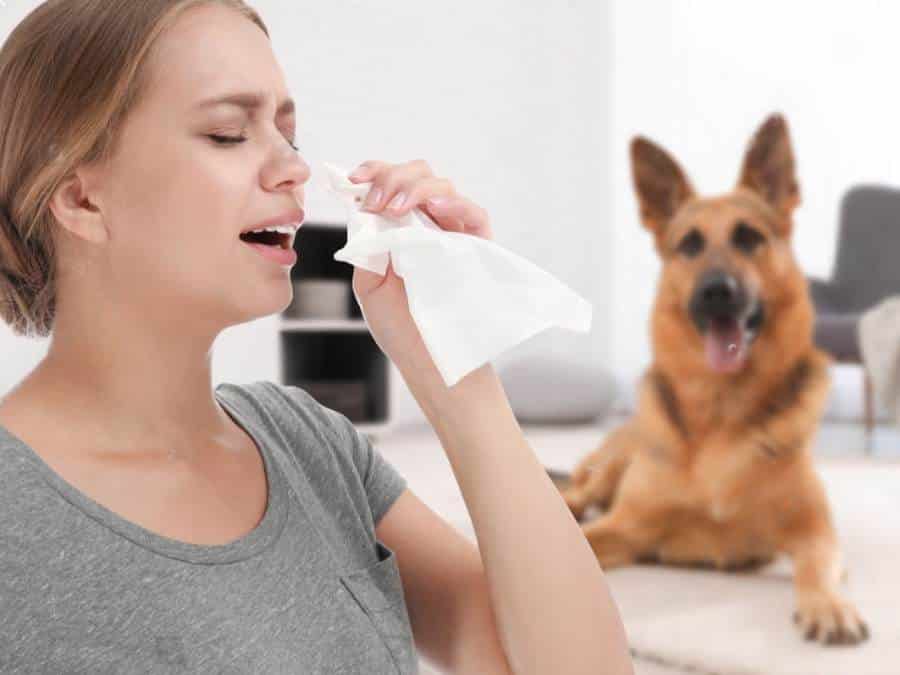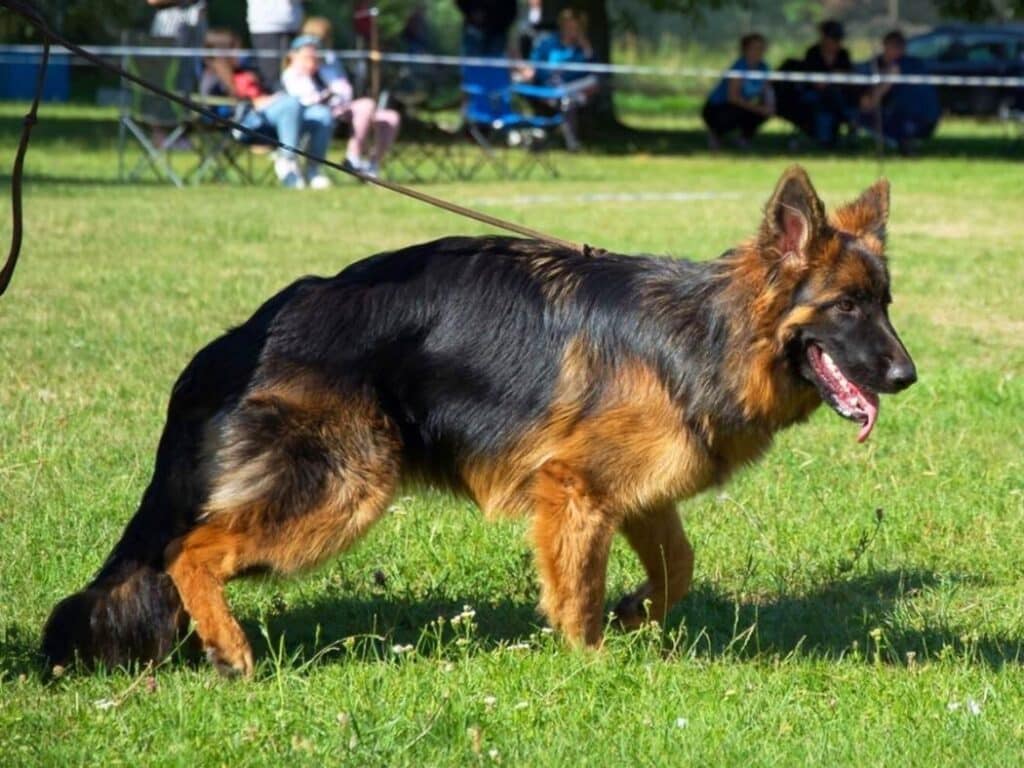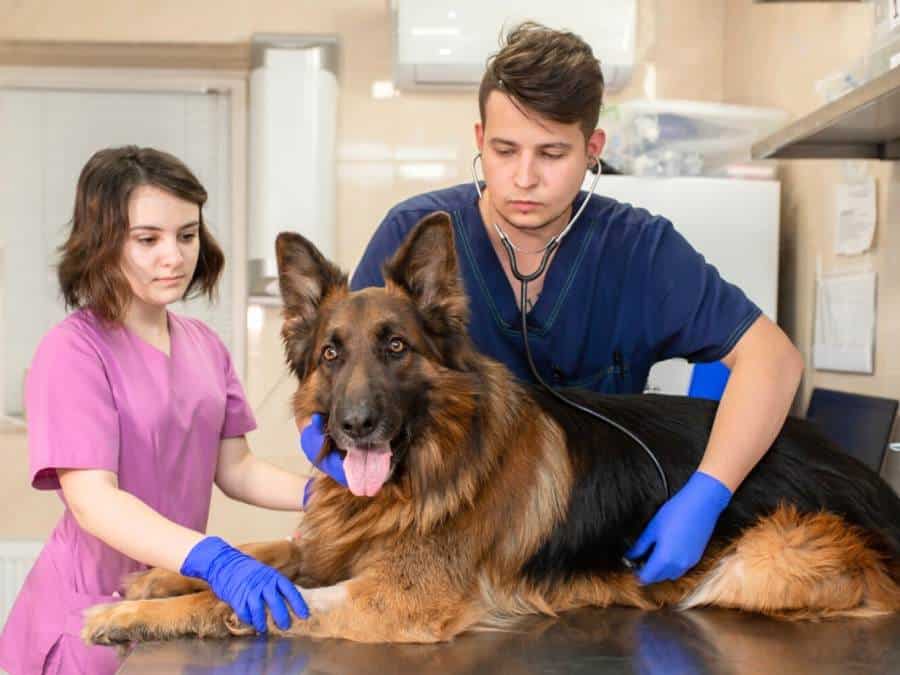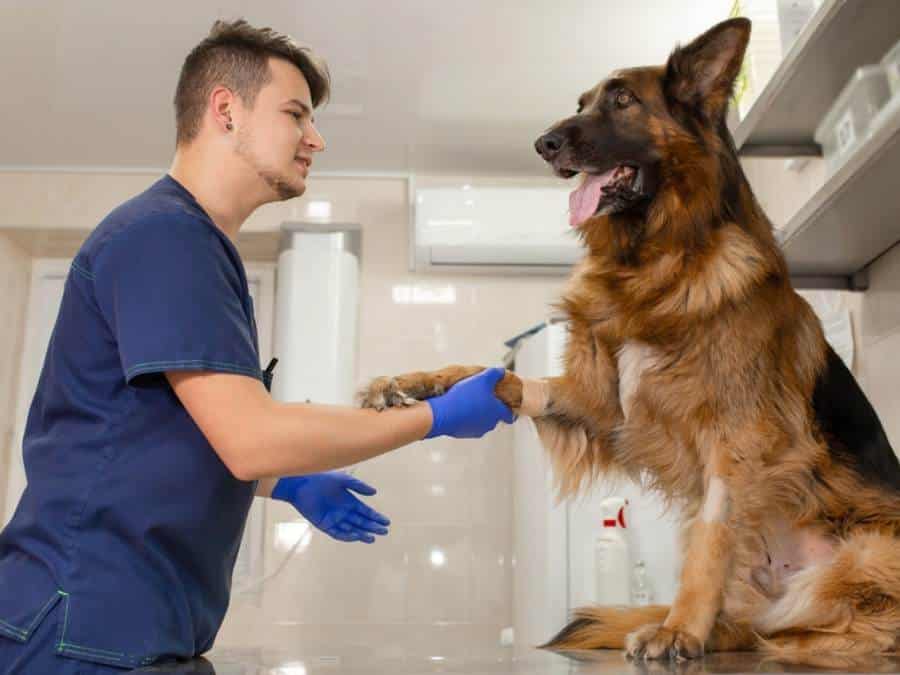Contrary to popular belief, German Shepherds are not hypoallergenic. These dogs have a double coat that sheds hair and dander regularly, which can trigger allergies in sensitive individuals.
People who have serious allergies to dogs may experience difficulty breathing when they are in a house with a German Shepherd.
However, even individuals with mild allergies will have a reaction to GSDs. Common symptoms include a runny nose, sneezing, and itchy, watery eyes.
In the following sections, we’ll discuss why German Shepherds are hypoallergenic, and provide tips for managing allergies if you’re planning to welcome one into your home, or if you already have one.
Why are German Shepherds Not Hypoallergenic?
German Shepherds are not considered hypoallergenic due to the presence of allergens in their fur and dander. These allergens, such as proteins found in saliva, urine, and dead skin cells, can trigger allergic reactions in sensitive individuals. (Study)
When a person with allergies comes into contact with these allergens, their immune system reacts by releasing histamines, leading to symptoms like sneezing, itching, and watery eyes.
Also, German Shepherds shed heavily. According to the American Kennel Club, GSDs have a double coat, consisting of a dense, straight outer coat and a softer undercoat.
The outer coat sheds moderately throughout the year, while the undercoat sheds heavily twice a year during seasonal changes.
When German Shepherds shed, they release dander (tiny, even microscopic, flecks of skin) and hair into the environment, potentially causing allergic reactions in sensitive individuals.
Even though regular brushing and grooming can help minimize shedding and dander production, it does not eliminate them entirely.

What Causes Dog Allergies in Humans?
According to the Asthma and Allergy Foundation of America, dog allergies in humans are typically caused by proteins found in a dog’s skin cells, urine, and saliva. The primary allergens are proteins produced by glands in a dog’s skin and are carried in the air on tiny, lightweight flakes of skin (dander).
When a dog grooms itself, the allergens present in its saliva can also be spread to its fur.
Let’s explore some of the common causes:
1. Pet Dander
One of the primary culprits behind dog allergies is pet dander. Dogs, including German Shepherds, produce dander, which consists of tiny flecks of skin that are shed regularly.
These microscopic particles can trigger an allergic reaction in sensitive individuals when they come into contact with them.
2. Saliva and Urine
Although it may not be as well-known as pet dander, a dog’s saliva and urine can also contain proteins that cause allergies in humans.
When dogs lick themselves or urinate on surfaces, these allergens can be left behind and become airborne or stick to furniture and carpets.
3. Canine Feces
When dogs defecate, proteins present in their waste can become airborne and cause allergic reactions if inhaled by sensitive individuals. It is important to properly dispose of dog waste to minimize exposure to these allergens.
4. Cross-Reactivity
In some cases, individuals who are allergic to other animals such as cats or rodents may also experience allergic reactions to dogs.
This cross-reactivity occurs because certain allergenic proteins found in different animals are similar, leading the immune system to recognize them as the same or similar substances.
5. Environmental Factors
Environmental factors can play a role in exacerbating dog allergies. For example, poor indoor air quality, high humidity levels, and inadequate ventilation can contribute to the accumulation of allergens in the home, making allergic symptoms worse for susceptible individuals.
Understanding the causes of dog allergies is crucial for managing and minimizing allergic reactions.
While it may not be possible to eliminate all allergens associated with dogs completely, there are steps that can be taken to reduce exposure and alleviate symptoms.

How to manage your allergies if you already own a German Shepherd?
If you have allergies but you already own a German Shepherd, there are a few steps you can take to reduce your allergy symptoms. Try these tips to keep the dander to a minimum.
1. Invest in a good vacuum cleaner
Vacuum and dust your home frequently to remove pet dander from surfaces. Use a vacuum cleaner with a HEPA filter to trap smaller particles.
Consider getting a robot vacuum to ensure your floors are regularly cleaned
2. Don’t allow your dog on the furniture
Teach your dog to rest on the ground or in their designated bed to avoid being near allergens when you sit on the sofa.
3. Create allergy-free zones at home
Designate certain areas of your home as “allergy-free zones,” such as your bedroom. Keep the dog out of these areas to minimize your exposure to allergens while you sleep.
4. Buy an air purifier
An air purifier with a HEPA filter can help manage allergies by removing airborne pet dander and other particles. It reduces allergen exposure, improves indoor air quality, and controls odors associated with pets.
Placing an air purifier in key areas, such as the bedroom, can enhance overall comfort and sleep quality for allergy sufferers.
5. Cover your AC and air vents with filters
Vent filters can capture airborne particles, including dust, pollen, pet dander, and other allergens. This prevents these particles from circulating throughout your home when the HVAC system is running.
Use these specialized vent filters to cover the vents in any allergy-free rooms, like your bedroom, to keep pet hair out.
6. Maintain good personal hygiene
Wash your hands after handling your dog, and avoid touching your face. This can help prevent allergens from coming into contact with your eyes and nose.
Also, change and wash your clothes frequently to reduce the risk of allergies.

7. Groom your dog regularly
Regularly grooming your dog’s coat can help reduce shedding and dander. Consider doing this outside to minimize indoor allergen exposure.
Also, to prevent loose hair from floating around your house and causing allergies, it is recommended to give your dog weekly baths using a deshedding shampoo. This will help the loose hair go down the drain instead of lingering in the air.
8. Wash bedding and soft furnishings
Wash your dog’s bedding regularly, and use allergen-proof covers on pillows and mattresses.
Wash curtains, blankets, and other soft furnishings that may trap pet dander.
9. Provide good-quality dog food
Feeding your dog high-quality food supports overall health, including a shiny coat and healthy skin. This can reduce shedding and dander, potentially minimizing allergens that contribute to human allergies.
10. Give your dog fish oil supplements
Fish oil supplements provide omega-3 fatty acids that can promote a healthy coat and skin in dogs, potentially reducing shedding and dander, which may help alleviate allergies in humans.
11. Try allergy medications
Consider taking over-the-counter or prescription antihistamines to help control allergy symptoms.
Consult with your healthcare provider to determine the most suitable allergy medication for your specific symptoms.
12. Consult an Allergist
If your allergies are severe, consider consulting an allergist for personalized advice and possible allergy shots (immunotherapy) to desensitize your immune system to pet allergens over time.
By implementing these steps, you can minimize the presence of allergens such as dander in your home, creating a more comfortable environment for both you and your German Shepherd.

What Can You Do If You’re Allergic To German Shepherds?
If you have allergies but still want to bring a furry friend into your life, there are options for you. While German Shepherds may not be the best choice due to their potential to trigger allergies, there are other breeds that are considered more hypoallergenic.
These low-allergy breeds can provide companionship without causing excessive sneezing or itching.
Hypoallergenic Dog Breeds for German Shepherd Lovers
- Poodle
- Portuguese Water Dog
- Bichon Frise
- Schnauzer
- Yorkshire Terrier
- Maltese
- Shih Tzu
- Afghan Hound
- American Hairless Terrier
- Bedlington Terrier
- Chinese Crested
- Irish Water Spaniel
- Maltese
- Xoloitzcuintli
- Kerry Blue Terrier
Remember that while these breeds are generally considered hypoallergenic dog breeds, individual reactions may vary. It’s essential to spend time with the dog you’re considering adopting or interacting with before making a final decision.
Is There a Hypoallergenic German Shepherd Mix?
If you have allergies and are considering getting a German shepherd mix, it’s important to understand that most German shepherd mixes will likely cause the same allergy problems as purebred German shepherds.
This is because allergies are primarily triggered by pet dander, which is found in the skin cells, saliva, and urine of animals.
However, there is one particular mix that may be more suitable for individuals with allergies – the German shepherd-poodle mix, or the Shepadoodles. It is the best-known and most common hypoallergenic German Shepherd mix.

Poodles are known for their hypoallergenic qualities, as they have hair instead of fur and shed less dander.
However, it’s essential to ensure that you get a third-generation puppy from a breeder who specializes in breeding non-shedding puppies.
First or second-generation puppies can still inherit the double coat of their German shepherd parent or grandparent, which could potentially trigger allergies.
By the third generation, a dedicated breeder can ensure that all the puppies inherit the poodle’s non-shedding coat. This means that these puppies are less likely to produce allergens that can cause allergic reactions in sensitive individuals.
It’s important to note that while hypoallergenic breeds may produce fewer allergens than others, no dog breed is completely hypoallergenic.
The term “hypoallergenic” refers to breeds that are less likely to cause allergic reactions but does not guarantee an allergy-free experience for everyone.
Conclusion
So, there you have it! German Shepherds are not hypoallergenic. Despite their many wonderful qualities, their shedding and dander production makes them a poor choice for individuals with allergies.
If you’re an allergy sufferer who has always dreamed of owning a German Shepherd, don’t worry! There are still options available to you. Consider looking into alternative breeds that are known to be hypoallergenic or explore the possibility of a hypoallergenic German Shepherd mix. Remember to consult with breeders, allergists, or rescue organizations to find the best fit for your specific needs.
Frequently Asked Questions
1. Can German Shepherds be considered hypoallergenic?
No, German Shepherds are not hypoallergenic. They have a double coat that sheds throughout the year, which can trigger allergies in sensitive individuals.
2. Are there any dog breeds similar to German Shepherds that are hypoallergenic?
Yes, if you’re looking for a hypoallergenic alternative to German Shepherds, you may consider breeds like the Poodle or Portuguese Water Dog. These breeds have hair instead of fur and produce fewer allergens.
3. How can I manage allergies if I own a German Shepherd?
To manage allergies while owning a German Shepherd, regular grooming is crucial. Brushing their coat frequently helps reduce shedding and dander in your home. Using air purifiers and keeping your living space clean can minimize allergen exposure.
4. Is there a German Shepherd that is hypoallergenic?
There is no purebred German Shepherd that is hypoallergenic. However, if you mix them with Poodles, you can get Shepadoodles, which are dogs that shed very little and hence can be considered a hypoallergenic dog breed.
Learn more about German Shepherds in the following articles:




